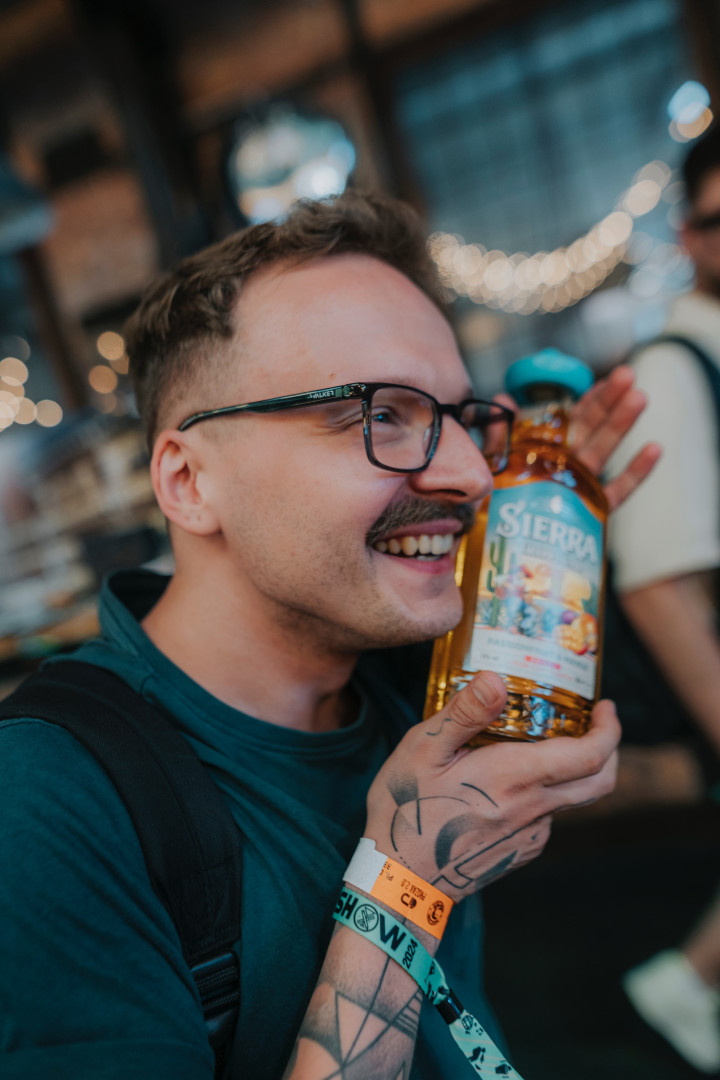Still underestimated, but they have huge potential in gastronomy. Podcast "What's Going On Behind the Bar"

- The guest of the podcast "Co Sływać za Barem" is Piotr Ciemny, a lover of wild plants and herbs, known as "Chwaściak".
- Piotr points out the differences in the approach to collecting wild plants in Denmark and Poland. In Denmark it is natural and common, while in Poland there is still skepticism and fear.
- Piotr combines his passion for wild plants with the creation of herbal spirits, such as tinctures. In his work with bartenders, he shows how to introduce natural flavors into drinks, paying attention to his own taste preferences, such as gin and tonic and experiments with elderflowers.
- Piotr Ciemny is interviewed by: Szymon Szostek, Brand Ambassador at Stock Polska and Janusz Trendewicz, Portfolio Education Manager at Stock Polska.
Piotr, although he collects wild herbs, does not identify with the traditional concept of a herbalist, which is often associated with a person in galoshes and a bag full of plants. He prefers the term "weed man" because he specializes in collecting wild plants, the use of which is wide, from culinary to natural medicine.
This is still a rarity in Polish restaurants.Piotr began his culinary career in Poland, working in bars and restaurants. In time, wanting to fulfill his dream, he moved to Copenhagen to work in one of the most renowned restaurants in the world, 108, which has one Michelin star. There, he learned a completely different work system – based on respect, cooperation and taking care of the health of employees. In 108, he also met Michel, who took him on a walk in the surrounding forests, giving rise to his love of picking wild herbs, which later ended up on plates in elegant restaurants.
One of the most surprising aspects of working in this restaurant was that, in addition to the intensive work in the kitchen, the employees also had access to a psychologist, which is still rare in Polish restaurants. Piotr says that the psychologist's help was invaluable, especially in the context of the enormous pressure that a Michelin restaurant put on.
Working at Noma, because that was also where Piotr had the opportunity to work, was not only a professional challenge, but also a personal one – taking care of physical and mental health was as important as serving perfect dishes.
After returning to Poland, Piotr noticed a big difference in the approach to work and employees in Polish restaurants. On the one hand, the experience at Noma taught him how important cooperation and mutual respect are, on the other – in Poland, such an approach is often lacking. Piotr says that after returning to the domestic market, he had the opportunity to experience how employees are treated differently, even in such basic positions as a dishwasher.
A passion for wild herbs can be a way to enter the highest level of gastronomyHis story shows that a passion for wild herbs can be not only a way of life, but also an entry into the highest level of gastronomy, where sensitivity to nature and the health of employees is as important as perfect culinary technique.
Piotr Ciemny shares his experiences with using wild herbs in gastronomy. He notes that in Denmark the approach to collecting herbs is more open and natural. He often encountered situations where locals brought herbs they had collected themselves to restaurants, which were immediately used in the kitchen. In Poland, on the other hand, there is still more caution and skepticism towards wild plants. Piotr says that he often encountered negative reactions when he collected herbs in public places – people looked at him strangely, and sometimes even treated him as if he were "crazy".
Piotr notes that in Denmark and Sweden there is a greater awareness and respect for nature, and collecting wild plants is something natural there, not a strange fashion. In Poland, however, wild herbs are starting to be treated as a "fashion" and are becoming more and more commercial. It is worth noting, however, that in Poland we too often treat this phenomenon with distance, treating it as something exotic.
Piotr believes that wild herbs have huge potential in mainstream gastronomy, although they are still not fully appreciated.
- Compared to mushrooms that Poles have been collecting for years, wild plants still raise concerns, even though they are easier to recognize and less risky - he says.
He suggests that it is worth introducing education about wild plants at the primary school level, teaching children which plants are edible and which are poisonous.
From this point of view, Ciemny calls for a change in thinking and approach to collecting wild herbs, which can become an important element of local gastronomy, and not just a passing fad.
How to start an adventure with wild plants?Piotr talks about the popularity of wild plants in Poland, drawing attention to the controversial example of elderberry flowers. Although some people warn against using them, Piotr explains that only in large quantities can they be harmful, as in the case of dill. He emphasizes that moderation is key. When starting an adventure with wild plants, Piotr advises not to be guided only by appearance, to avoid collecting unknown plants on your own and to gradually learn about edible ones. Piotr recommends beginners to start with basic plants, such as dandelion or yarrow.
Preparing herbs in the kitchen is also a subject that Piotr explores. He notices that wild plants can be used to create alcohols, such as maceration. An example are the tinctures that he creates himself from walnuts, dandelion or yarrow. Herbal tinctures have become one of the elements of his workshops, which he conducts mainly for bartenders. He believes that herbs in alcohol are a great way to transfer natural flavors to drinks.
- I notice that many bartenders are becoming more open to different herbs, especially those that grow locally. I like the idea of collecting herbs nearby, not only the popular ones, but also the more valuable ones - says Piotr Ciemny.
- When it comes to flavours, I have quite specific preferences – I don't like very sweet things, especially cocktails. Passion fruit? Definitely not my cup of tea. I wonder, however, if it could be replaced with something local, such as sea buckthorn – frozen works great, even though it is protected, she adds.
His favorite cocktail is gin and tonic. He also likes to experiment, for example with tonic and elderflowers. "I only drink vodka occasionally, because I prefer alcohol with a bitter taste, like stomach," he adds.
- To sum up, for me the most important thing is the process – both in alcohol production and in educating people about all the details that make a drink truly unique. It is this process of creation that makes us appreciate it more, he says.
Podcast "What's Up Behind the Bar". Presenters' BIO- Szymon Szostek, associated with the bar scene for 10 years, recently became the ambassador of gin and Latin spirits for Stock Spirits Group. Professionally and privately, he is an enthusiast of good tequila. In his free time, he is interested in contemporary popular internet culture, social media, culinary arts and interesting facts from the world of computer games.
 Szymon Szostek
Szymon Szostek- Janusz Trendewicz, Portfolio Education Manager at Stock Polska. Associated with the alcohol industry for almost 30 years. Expert and long-time practitioner of mixology, participant of countless training courses. Participant and juror of many bartending competitions. Specializes in the history of alcohol, which for him is a complement to the history of the world. He uses his knowledge and experience to restore the true history of Polish alcohols.
 Janusz Trendewicz
Janusz Trendewiczwell.pl




